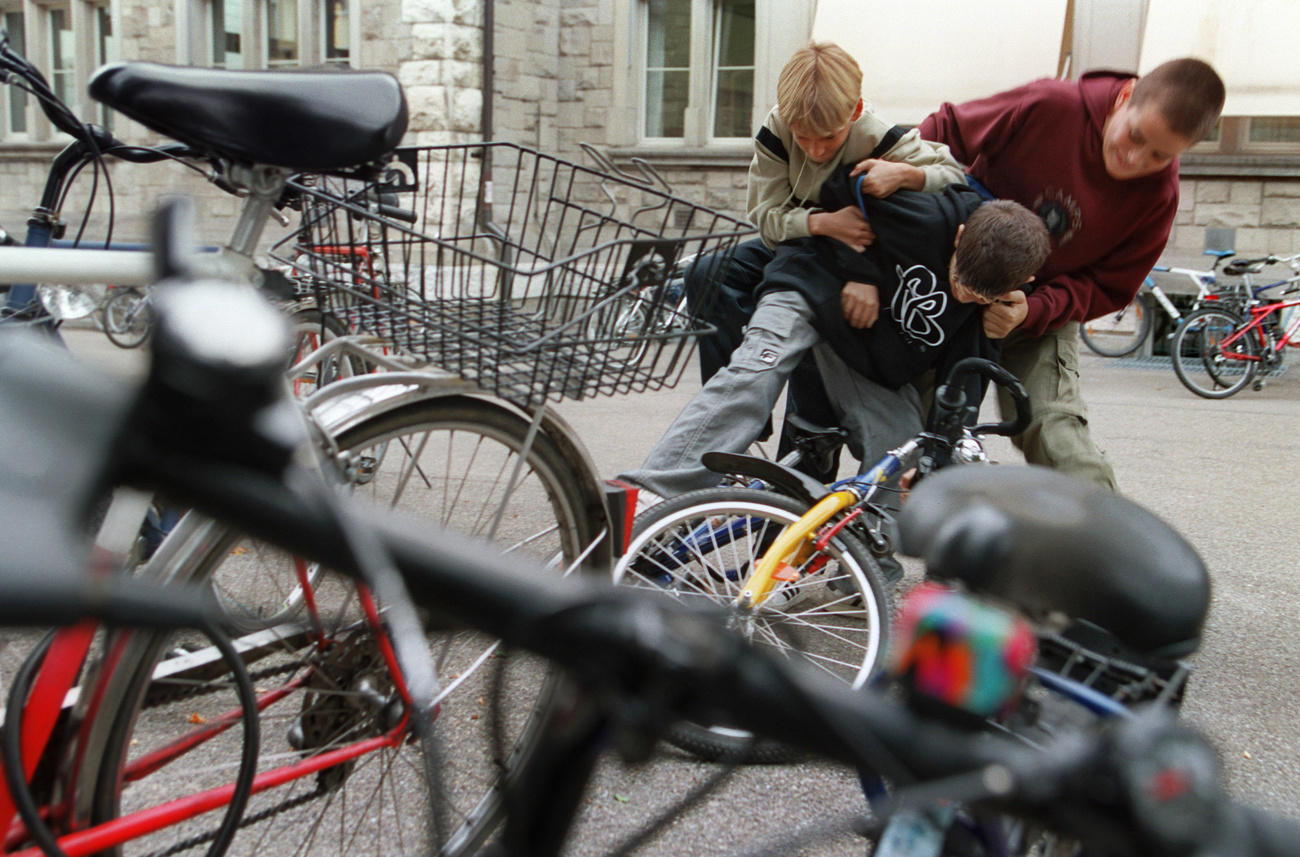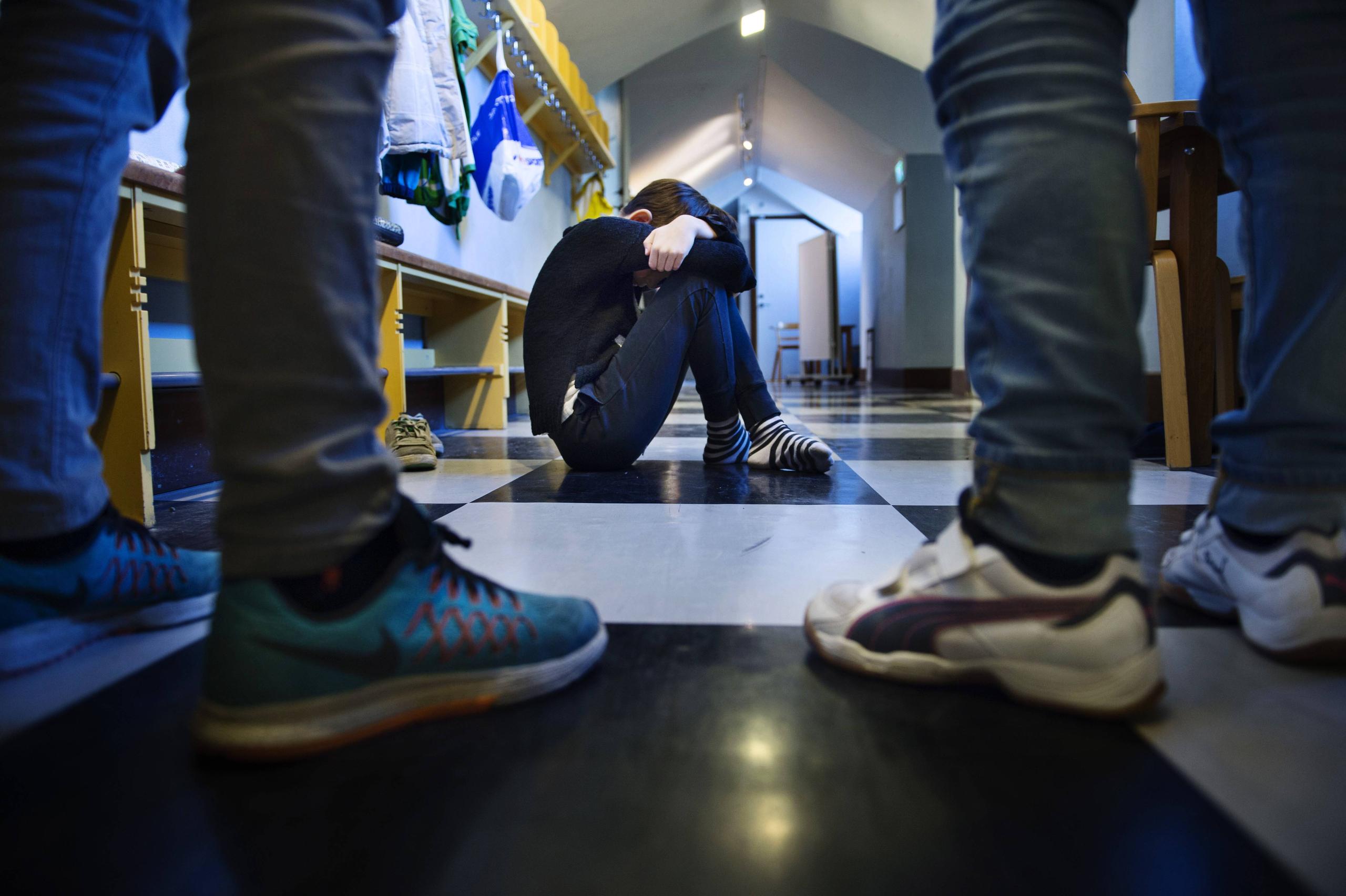Schools declare war on bullying

Roughly one in ten children in Switzerland becomes a victim of bullying during their schooling, an experience that can lead some of them to suicide. Now schools are fighting back, with one institution in Geneva choosing to adopt a method developed in Finland to tackle group dynamics.
A class of 12-year-olds at the Institut International de Lancy, an international school in Geneva, has just taken part in a role-playing exercise. The seventh-graders were able to step into the shoes of a student being bullied by classmates, the bullies themselves, and silent bystanders, who don’t have the courage to come forward and help the victim.
“Bullies are not necessarily bad kids – they’re sometimes fighting against something themselves,” says one boy.
“As a bully you feel you’re in a position of power,” one girl sums up.
At the end of the exercise, the children share their feelings and thoughts with the teacher. They try to work out rules for getting along and to nip bullying in the bud before it can occur. Talking about it has helped to make the students more aware of the problem.
“During the last lesson, my students realised that they had picked on one of their classmates in the past,” says Ingrid Defretin, a French teacher. “We tried to understand why this happened and how it could have been avoided.”
For nearly a year now, the school’s 1,400 students have regularly participated in workshops of this kind. These activities are part of the KiVa anti-bullying programme, which the school introduced in August 2020. The method was developed at the University of Turku in Finland in the late 1990s, with support from the Finnish Ministry of Education and Culture. Today it is used in most Finnish schools, as well as in schools in more than 18 other countries.
The programme is based primarily on prevention. It provides teachers with a wide range of materials and ideas for role-play and other age-appropriate activities.
There has been a notable rise in bullying in recent years. According to the latest surveyExternal link by the Programme for International Student Assessment (PISA), published in December 2018, the incidence of bullying has increased by at least 2% since 2015. Some 13% of 15-year-olds surveyed said they had regularly been made fun of, while 11% said they had been the object of rumours and 7% of physical aggression. Compared with other countries, Switzerland registered higher rates of bullying than its neighbours. However, it is difficult to know whether more cases actually occurred or more were reported.
No-blame approach
Yet it is clear that taunts, insults, threats and physical attacks are part of daily life for many students. The experience can even drive some children to suicide. In 2013, the death of 13-year-old Matteo, in neighbouring France, shocked the country. The teenager’s red hair had been enough to provoke taunting and mental and physical harassment from his classmates. He had hanged himself in his bedroom.
Prevention can help to curb the number of cases but not to completely eradicate bullying. That’s why the KiVa programme also offers a course of action for when cases do arise.
“We don’t punish a student who bullies a classmate, says Francisco Benavente, educational project manager and KiVa coordinator at the Institut International de Lancy. “Instead we look for solutions by having a dialogue with them.”
This approach has emboldened students to speak out.
“Students feel more comfortable about coming to talk to me about a problem, because they’re not afraid there’ll be consequences,” he says.
The subject of bullying in schools is frequently covered in the media and many schools have adopted programmes to tackle it. This is a good thing, but it is important to differentiate between bullying and ordinary conflict between students, cautions Benavente.
“Parents sometimes confuse the two,” he says. “Quarrels are unfortunately a part of life. Bullying, on the other hand, is repeated and deliberate behaviour, and has no place in schools or elsewhere.”
While parents can sound the alarm, it is essential that they stay out of bullying cases and let the school deal with problematic situations, the KiVa coordinator adds: “We need parents to trust us, so that we can help their children in the best possible way.”
Zero tolerance policy
All schools must take preventive action and adopt a response protocol for dealing with such cases, says Basile Perret, a senior lecturer and head of training at Lausanne’s School of Social Work and Health Sciences.
In Geneva, the Institut International de Lancy uses the KiVa programme, while schools in nearby canton Vaud have adopted the so-called “shared concern” method. Neuchâtel, another canton in Western Switzerland, has its own system. According to Perret, the key is to follow a non-blaming approach in order to reduce the risk of further stigmatisation.
“Some students say they went through hell after their tormentors were punished,” he explains. Instead, bullies should be brought on board and given help to work out for themselves what they could do to make the target feel better.
As for teachers and other school staff, it’s a question of having zero tolerance for bullying.
“The worst thing is to turn a blind eye,” says Perret. “When a situation gets out of hand, teachers must be able to enlist the help of a dedicated response team.” Some forms of abuse may even fall under criminal law, so schools should not hesitate to contact local authorities.
Swiss schools are gradually coming around to the need to act. Perret believes there is much work to do.
“One of the challenges will be keeping the various systems going in the long term with the resources available to these institutions,” he says. Among other things, schools need to make sure that a specific situation really has improved by carrying out regular monitoring, comparing points of view and involving all the different actors and observers – from teachers to canteen staff and school-bus drivers.
The war against bullying is far from over. “We must keep up the fight,” says Perret.
Translated by Julia Bassam; Edited by Geraldine Wong Sak Hoi

In compliance with the JTI standards
More: SWI swissinfo.ch certified by the Journalism Trust Initiative














You can find an overview of ongoing debates with our journalists here . Please join us!
If you want to start a conversation about a topic raised in this article or want to report factual errors, email us at english@swissinfo.ch.